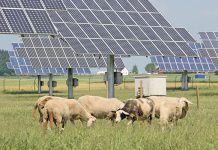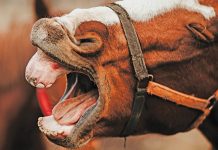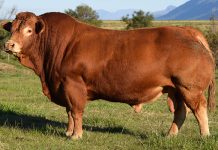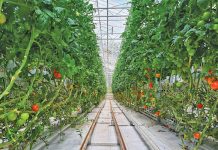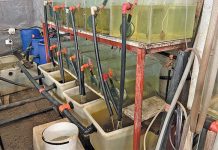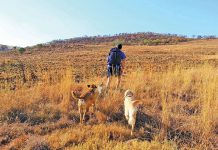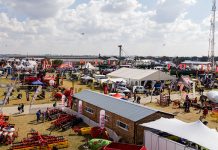
Photo: Limousin cattle breeders‘ society of Southern Africa
The Limousin Cattle Breeders’ Society of Southern Africa is excited to announce its 50th anniversary this year. This milestone will be commemorated with a series of events that celebrates five decades of excellence in breeding.
The festivities will be a highlight of the National Championships, scheduled for 30 April and 1 May 2025 at the Bloemfontein Showgrounds, with judging by the esteemed PJ Budler.
As part of the celebration, 15 of the breed’s top female animals will be showcased at the Leading Lady Auction, set for 7pm on 30 April. In addition, various novelty items will be auctioned off to raise funds for Limousin Southern Africa’s breed promotion initiatives.
This auction will be held with Vleissentraal and Johan van der Nest, and SwiftVEE as the society’s online partners.
“We are incredibly proud to celebrate 50 years of Limousin in Southern Africa,” says Jan Stiglingh, the president of the society.
“Reaching this milestone is a remarkable achievement that didn’t happen overnight. The journey began in the early 1970s when pioneers imported the first Limousin animals from France. Dedicated stud breeders, supported by councils committed to advancing the breed, have helped develop the golden breed over the years. While the society has faced various challenges along the way, after 50 years, we are still going strong. We can celebrate those challenges and the many successes we’ve experienced throughout this journey.”
More meat with less feed
The current trend in agriculture emphasises achieving ‘more with less’. To ensure economic sustainability, farmers must increase production while minimising costs. Additionally, cattle farmers face criticism for high methane emissions and are urged to adopt production systems that regenerate the land and sequester more carbon dioxide.
To achieve these goals, it is essential to implement breeding strategies thoughtfully. When selecting a breed based on efficiency, three main factors should be considered:
- Feed efficiency: Choosing breeds that convert feed into meat efficiently is crucial.
- Growth rate: Breeds with faster growth rates allow farmers to reach market weight sooner, reducing the time and resources required per animal.
- Carcass yield: Selecting breeds that yield a higher percentage of meat relative to the animal’s live weight is vital for maximising meat output.
Limousins are particularly well suited to meet these requirements as purebred herds or used as terminal sires in crossbreeding programmes due to their genetic advantages.
The genetics behind Limousins
The Limousin breed is unique in its high prevalence of the F94L myostatin ‘profit gene’. The primary benefit of the F94L gene is that animals with two copies of this gene (or one copy in the case of crossbreeding) can produce more muscle, yielding more meat.
The F94L myostatin gene variant leads to a moderate increase in muscularity and should not be mistaken for ‘severe double-muscling,’ which is associated with other myostatin variants found in breeds such as the Belgian Blue.
Furthermore, the F94L gene does not cause calving difficulties or decreased fertility, often seen with other myostatin variants. In fact, Limousins are known for producing small calves that grow quickly.
Breed improvement
Since Limousins were imported from France 50 years ago, breeders in the region have made significant genetic progress to enhance the breed’s commercial relevance. Limousins have developed into a medium-framed, easy-fleshing, and early- maturing breed.
The breed’s original traits, namely fertility, hardiness, natural adaptability, good walking ability, and calm demeanour, continue to contribute to its success today.
The Agricultural Research Council’s analysis of genetic trends in Limousins has demonstrated consistent improvement over the past 20 years. The breed has successfully maintained stable birthweights while increasing weaning and yearling weights.
Additionally, genetic merit for milk production has risen by 4kg, which is quite significant. Furthermore, there has been a notable increase in scrotal size while gestation lengths have decreased, both of which are positive genetic traits.
Crossbreeding with Indigenous breeds
Indigenous breeds in South Africa, while well adapted to local conditions and often possessing unique qualities, face challenges within the feedlot system. One of the primary issues is their lower-than-average yield per carcass compared to other breeds.
This reduced yield translates into financial penalties for producers who rely on feedlots, where efficiency and profitability are often prioritised.
To address this challenge, producers can opt to crossbreed with Limousins to enhance the overall yield and quality of the cattle produced, thus improving the economic viability of raising indigenous breeds in a feedlot setting.
Ultimately, this practice will support the livelihoods of farmers who rely on indigenous breeds and promote genetic diversity and the preservation of unique local breeds, allowing them to thrive alongside more commercially dominant breeds in the industry.
Seedstock producers play a crucial role in the agricultural supply chain, and our responsibilities are significant. We are tasked with producing high-quality breeding stock that meets the market’s specific needs. This requires us to not only focus on quantity but also to ensure that the genetic traits of our livestock align with current industry demands.
The effectiveness and success of the entire livestock industry heavily depend on the actions and decisions made by seedstock producers.
Our work impacts not just our own businesses but also influences other farmers, consumers, and the agriculture sector as a whole.
While we have to breed resilient animals that can thrive in Southern Africa’s rapidly changing climate conditions, we also need to remain economically viable.
The world is celebrating with us!
As we commemorate the 50th anniversary of the Limousin Breeders’ Society of Southern Africa, it is essential to acknowledge that the journey, along with every registered Limousin breeder, is not undertaken in isolation. We are supported by fellow breeders, industry partners, sponsors, and supporters who have joined us on our journey over the years.
Additionally, we are grateful for the encouragement of our international Limousin friends around the globe. We have received congratulatory messages from various countries, including France, Germany, Canada, the US, the Netherlands, Hungary, the UK, Australia, and New Zealand.
Together, we share a passion for the golden breed and remain committed to enhancing global Limousin genetics.
We invite everyone to meet members of the society at our National Championships, scheduled for 30 April and 1 May 2025 at the Bloemfontein Showgrounds. Come and take part in our discussion of the Limousin, the breed with the profit gene.
For more info visit limousinsa.co.za.

